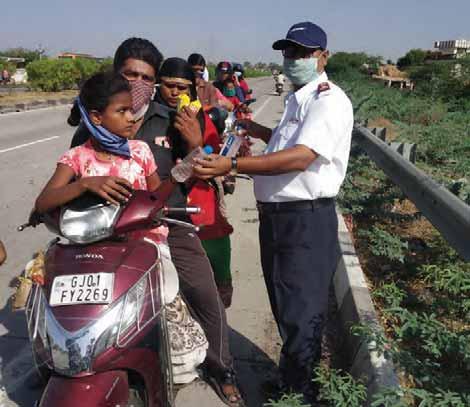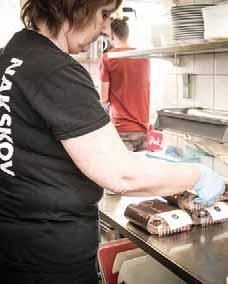
9 minute read
Prayer pointers
GATESHEAD: The corps has delivered ration bags to senior members containing essentials, treats, a card, VE Day newspapers and a gift. As some young people connected with the corps have not been in the country very long, the corps is providing additional ‘school’ work, as well as craft boxes, competitions, toys and games. A new social media group has allowed almost everyone to keep in touch, and those without internet access have an individual contact group for inspiration and encouragement. – AH
GLOUCESTER: Corps folk have found online Sunday morning gatherings beneficial. Before each worship meeting a group of members connect virtually to pray for the meeting and people affected by the coronavirus. After worship everyone enjoys a virtual coffee and a chat, finding out how they all are and sharing requests for prayer or support. – AB
CIRENCESTER: When pupils at Chesterton Primary School reception class produced a video to thank key workers, Monty borrowed his father’s cap and tie and his mother’s epaulettes to represent the Army. Monty and his brother, Maxwell, also created pictures of rainbows and smiley faces to decorate the corps charity shop windows and attract attention to the information on display for those needing assistance. – MG
BELFAST TEMPLE: The corps has adapted its ministry through ‘worship at home’ sheets, delivered with the Army papers, a wave and sometimes other goodies. This is especially valued by those without internet access. Corps Secretary Tom McAuley said: ‘Like so many self-isolating, my weekends are made more bearable by the efforts of kids like Connor, who faithfully delivers my copy of Salvationist every Friday.’ – KW
Secretary for Spiritual Life Development LieutColonel Jayne Roberts introduces the final week in this series of daily prayer topics. D URING these weeks of lockdown we pause at noon each day to unite in prayer. This specific time may not be possible for everyone but whenever you take time to pray, the following subjects are offered, which particularly relate to concerns around the impact of the pandemic on daily life.
Monday
Let us pray for local and national leaders who continue to instruct and advise us as we seek to move out of lockdown.
Tuesday
We pray for all key workers today and thank God for the services they provide. May we continue to appreciate them and their work.
Wednesday
These past weeks have brought us a new awareness of the wonder of God’s creation. We rejoice to see the spring flowers, clear blue skies, leafy green trees and hear the birdsong. May we continue to appreciate the beauty around us and care for our environment.
Thursday
Every Thursday we have taken the opportunity to thank and celebrate NHS staff and all carers at 8 pm. Although this may have ended, let us continue to pray for everyone in our community working for people’s medical, practical and emotional well-being.
Friday
We ask God’s blessing today on our family members and the close friends we have been unable to visit for many weeks. Lord, we thank you for the anticipation of being together and sharing in conversation face to face.
Saturday
Lord, we are grateful for all that we have learnt during this unexpected time of living under various restrictions. Thank you for the peace and safety of our homes. Be near to those who have been bereaved during this time and those who have suffered illness and pain in isolation.
Sunday
We thank you God for inspiring so many new expressions of Salvation Army worship, prayer and fellowship online and via printed matter. May we continue to learn from these days when thousands of people have connected.
O This week’s link is to resources available from the Society for Promoting Christian Knowledge. They have published a book by Tom Wright, God And The Pandemic - A Christian Reflection On The Coronavirus And Its Aftermath. Profits will go towards supporting SPCK initiatives, including free daily bedtime story videos, with printable worksheets (spckpublishing.co.uk/ faith-at-home) and free ebooks from a selection of authors (spckpublishing.co.uk/free-ebooks)
Army extends coronavirus response
IHQ
THE coronavirus pandemic remains a worldwide crisis, with the World Health Organisation reporting that more than 4.5 million cases of Covid-19 have been recorded globally*. While much of the world remains in some form of lockdown, there are signs of encouragement as some countries carefully start to ease restrictions where community transmission of the disease has been brought under control.
The Salvation Army now has coronavirus responses in more than 100 of the 131 countries in which it officially operates and continues to work to meet needs caused by or amplified by the pandemic. Food security remains a major priority for the Army’s International Emergency Services, as many vulnerable people are suffering with the breakdown of the subsistence approach.
FEEDING Angola
The Army has identified 2,000 individuals – primarily women – in great need of food assistance. Because of necessary government restrictions on movement, access to reliable sources of food has become impossible. The Army is stepping up to provide emergency food parcels containing cereal, beans, oil, sugar and salt because these items have nutritional value.
Colombia and El Salvador
Providing emergency groceries to people experiencing homelessness is central to a new initiative being introduced by the Army in Latin America. Project Officer Ricardo Gomez explains: ‘[They] don’t have access to food supplies. They have been fired, and there is no one on the streets so they cannot even beg. Common places to find shelter and bathroom [facilities] are closed.’
Salvation Army personnel are developing new ways of ensuring health and safety while also providing essential support. Food is being portioned into disposable containers, in order to reduce the risk of virus transmission. Team members use alcohol hand gel before and after each delivery, maintaining a distance of two metres. Face masks and gloves are worn, and there is frequent disinfection of surfaces touched. The health authorities in both countries are regularly consulted.
India
India
Migrant workers in the transport industry have lost their jobs while on the move. Many lorry drivers, for example, have not been able to return to their homes, although some are endeavouring to rejoin their families by walking long distances. Food and clean drinking water are not routinely available on these journeys, because roadside facilities are closed. The Army is undertaking a major logistical exercise to provide around 20,000 migrants with simple snack boxes across ten divisions in the west of the country.
Philippines
Salvation Army teams are helping to feed people who have been diagnosed with coronavirus and quarantined in sports stadiums and other official venues in Manila.
Bahrain
A pre-paid grocery voucher scheme is offering relief to nearly 250 families and individuals.
Mexico
In Xochimilco vouchers can be exchanged for a food box, in a scheme designed to feed a family of three for at least two weeks. Meanwhile, prepared food will be handed out from the Army’s La Esperanza shelter to 125 people experiencing homelessness per day for 60 days.

Cuba, the Dominican Republic and Nicaragua
Food support for vulnerable families will be introduced following needs assessments.
Jamaica
The Ministry of Local Government has asked the Army to help feed people who have lost their jobs in the capital, Kingston. Around 100 families (300 individuals) will receive emergency food parcels, and approximately 200 people experiencing homelessness will be given daily cooked meals.
Belize
The Army is continuing its feeding programme for people affected by the coronavirus pandemic, at least until the end of the month. More than 10,000 pantry packages have been distributed since the programme began in March.
HYGIENE Uruguay
Teams of officers and volunteers have been distributing cleaning and hygiene kits to those who live in the neighbourhoods of La Humedad and El Cerro, near Salto. This is part of an ongoing commitment to support them and walk alongside the most susceptible communities during this health emergency.
Uruguay

Kenya
Health awareness programmes are taking place in numerous locations. Teams are disseminating information about coronavirus – and its control and prevention – to communities in Kakamega, Kolanya and Migori. House-to-house visits are taking place with the necessary precautions to ensure that everyone hears the important hygiene messages. Community training is also being carried out in strategic locations.
Indonesia
The Army’s hospitals and clinics – many of which serve rural and vulnerable communities where there is little other healthcare provision – are on the front line. Six hospitals in East Palu, North Sulawesi and Java are treating on average more than 6,400 patients per month. To ensure the safety of service users and staff, additional personal protective equipment is being secured. The Army is also providing doctors, nurses and other healthcare workers with vitamin supplements.
SPIRITUAL CARE Australia
The Army held a National Day of Prayer as a precursor to a 21-day season of prayer, which began on Pentecost Sunday. Territorial leaders Commissioners Robert and Janine Donaldson are keen to bathe the Army’s ongoing coronavirus response in prayer, stating: ‘As we see restrictions being eased, the question we all have is: what will this look like as we move forward?’ To that end, members and people linked to the Army are being invited to assess and evaluate the way resources are being deployed. Participants are also encouraged to consider new ways of delivering services and encouraging people in their personal expressions of faith.
Finland
Social media is being used by all corps to provide a means by which people can request and receive prayer, while copies of Sotahuuto (The War Cry) are being made available on request to social centre clients.

EASING RESTRICTIONS New Zealand
The Army is resuming most of its pre-lockdown welfare services as the government’s restrictions are eased to Level 2.
‘We are hoping to get many of our community ministry centres and family stores up and running,’ says Assistant Territorial Secretary for Mission Captain Gerry Walker. ‘But this will be dependent on being able to ensure we can continue to meet the restrictions.
‘Many of our staff and volunteers, particularly in our family stores, are aged over 70, and we need to make sure we can operate at a safe staffing level while not putting people at risk.’
Director of Addictions, Supportive Accommodation and Reintegration Services Lieut-Colonel Lynette Hutson says that work in her area of responsibility has continued throughout the lockdown, albeit in a modified way. The distancing rules have brought some ‘interesting innovations’, which have worked particularly well for clients addicted to gambling. This is often a hidden affliction, and Lieut-Colonel Lynette says that some individuals have found a socially distanced approach to be a less intimidating way of getting help, although ‘there is a point where people want human contact’.
Denmark
In Europe, Denmark is one of the countries leading the way towards a tentative, managed relaxation of restrictions. The economic factors of the ‘new normal’ remain uncertain, and the Army has been active in providing care packages for existing service users and individuals and families finding themselves in financial hardship.
As well as meeting essential needs, the Army has been including Lego sets with the family food parcels to bring a little enjoyment, thanks to generous donations from the Lego Group. Young people associated with the Army in Valby, Copenhagen, have helped to deliver the parcels, adhering to social distancing guidelines. The Army in Denmark has also been planning for a safe restoration of Sunday worship in light of the government’s intention to permit faith-related gatherings. – AR
O Get regular updates on the Army’s Covid-19 response around the world by visiting sar.my/covid19









